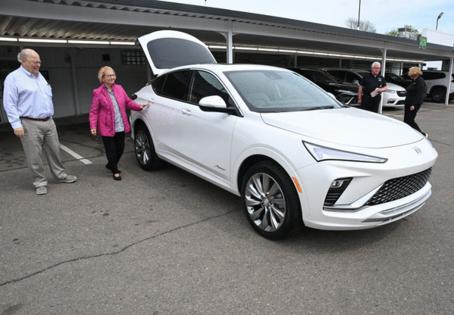Buick vulnerable to Trump tariffs: 'It could just disappear altogether'
Published in Business News
Buick is introducing a new sub-brand in China called Electra — but its future in the United States could be shaky, analysts say, if tariffs imposed by President Donald Trump remain on a majority of its products.
General Motors Co.'s upscale brand last year sold more than 157,000 vehicles in the United States that were imported from South Korea and China — almost 86% of its U.S. deliveries. With foreign production offering the strength of accessible pricing and profitability, high enough tariffs could alter dramatically that narrative and put the Tri-Shield brand in a precarious position.
“I’m worried about that,” Buick dealer Rhett Ricart in Columbus, Ohio, said about the brand importing so many vehicles in light of tariffs, especially levies that are frequently in flux. "That's what I’m worried about, that it'll be 150%. It's changed four times already."
The Envista, which starts at $23,800, and the Encore GX, which starts at $25,940, both ship from South Korea to be sold in the United States, though they're also built in China and designed for that country and other Asian markets. Those two vehicles represented 60% of Buick's U.S. sales. The Envision, which starts at $36,500, exports from China. The Enclave, with a starting price of $45,100, is Buick's only U.S.-built offering, built at the Lansing Delta Township Assembly plant in Michigan, which accounts for 14% of 2024 sales.
Buick exemplifies Trump's chief complaint with today's global auto industry: too many vehicles sold to U.S. consumers are made overseas. At the end of March, Trump announced 25% tariffs on vehicles imported to the United States that took effect April 3, and 25% tariffs on certain auto parts are set to take effect May 3. Trump, however, has suggested the parts tariffs could be adjusted due to the time it takes to relocate production to the United States — a key concern for automakers and suppliers.
The tariffs were imposed on the grounds of national security, with Trump arguing that a robust vehicle supply chain is necessary. Scheduled to appear Tuesday in Macomb County, Michigan, to mark his first 100 days in office, Trump has insisted the duties will increase U.S. manufacturing, create well-paying manufacturing jobs, and generate federal income to lower taxes and pay off national debt. Analysts, however, say the duties will increase vehicle prices and cause supply disruptions that could jeopardize jobs.
The 25% is stacked on top of existing duties. So, on China, there was an existing 2.5% tariff on vehicles and then Trump imposed another 20% tariff in response to the fentanyl drug trade. That would bring tariffs on vehicles like the Envision to 47.5%, according to a Barclays analysis. Trump has imposed a 125% tariff on China, but that doesn't affect imported vehicles.
"If tariffs make it impractical to import, the potential is there that it could just disappear altogether, the Buick brand," said Sam Fiorani, vice president of global vehicle forecasting at AutoForecast Solutions LLC. "It's very difficult to make the business case for Buick where the Envista and Encore GX have to play in the $40,000 range. They are very good $30,000 vehicles, but they’re underwhelming at $40,000."
GM declined an interview on what tariffs portend for the Buick brand.
Tariff fears
Buick's popularity in China saved the upscale brand over Pontiac in General Motors Corp.'s 2009 bankruptcy. Although U.S. sales struggled thanks to a sedan-heavy fleet and a reputation as a vehicle for old people, Buick's lineup over the past 20 months has been replaced and refreshed, propelling a 39% increase year-over-year in the first quarter of 2025.
Melissa Zelenak, 59, of northern Michigan's Central Lake took advantage of that fresh lineup in August when she purchased her 2025 Envista, nicknamed "Barbara" in honor of her Aunt Barbara who got her a discount on the vehicle. With the vehicle warrantied and delivered, she's grateful as tariffs take hold.
"Thank God I bought it when I did. The price was right, and no way would I buy a new one now," said Zelenak, who works in conservation. On tariffs, she added: "It's a bully move. I don’t think it's going to benefit anybody. It’s not going to bring America greatness."
Analysts predict that cost increases resulting from tariffs will lead to price increases for consumers. At this point, Jeff Laethem, general manager at Ray Laethem Buick GMC in Detroit, said GM is telling dealers it's business as usual, and nothing has been said about price increases.
"That's possible," Laethem said about Buick's future being questioned in light of tariffs. But, he added: "I don’t think they've said don’t worry about it, but all of our orders are still coming through."
Laethem, however, hasn't received a shipment from Asia-originated Buicks since the import tax took effect earlier this month. Those products have contributed to attracting much younger buyers than the brand has seen in the past. His showrooms and service shops saw a pickup in traffic after initial tariff announcements, though some of that has subsided.
"We saw a surge in not only Buick, but Buick, GMC and used cars," Laethem said. "It cooled in the last week or so. I don't know if it's like when the toilet paper sold out."
GM has said it's working with the Trump administration to find a more permanent trade solution. Fluctuating tariff policy in recent weeks has contributed to decision paralysis within the industry, analysts and executives say, citing uncertainty about what the tariff circumstances will be in a week, a month or longer.
But even if stability were assured, it could take a couple of billion dollars and easily three years to accommodate Buick's volumes for production in the United States, Fiorani said, noting that it doesn't currently have U.S. plants for its subcompact platform to build vehicles like the Envista and Encore GX. And if it did, they likely wouldn't sell at the current price point.
"Raising that price any significant amount eliminates the need for those in the lineup," he said.
Plus, moving production from South Korea would raise questions for plants there, and Korean labor unions are known for militancy, said David Whiston, analyst at financial services firm Morningstar Inc.
"Is that cost worth it to them, or do they keep paying a tariff?" he said about adjusting production there. "It's a tough decision for GM to make because they may have to decide 'we can’t operate like that,' but will that last just another year or two or four years or whatever it is?"
Some of GM's early manufacturing footprint in Asia was intended to support Chevrolet in Europe. When the company cut the brand in Europe and sold its operations there to a French rival, GM repurposed Asian plants to support other U.S. production.
Over time, Buick manufacturing in China increased along with the demand for compact cars there and elsewhere in Asia, said Stephanie Brinley, an S&P Global Mobility analyst. Combined with lagging interest in sedans among U.S. car buyers, Brinley said GM prioritized importing Buicks made in China and South Korea to sell in U.S. dealerships rather than splitting production across continents.
"Plants are built for decades," Brinley said. "This particular tariff situation is uncertain in terms of how long it's going to last, and it's come up quickly. Responding quickly is just not possible."
Many Buick dealerships share a showroom with GMC. If Buick went away, the GM truck-and-SUV brand would have to fill the gap with more Mexico-built Terrain and Lansing-assembled Acadia SUVs, Fiorani said.
GM could press for an exception to the tariffs. But given that so many parts for Buick are shipped from China to South Korea for Buick assembly, that could be a tough argument against national security concerns, said Michael Dunne, CEO of advisory firm Dunne Insights LLC and a former GM executive. If tariffs become a challenge for Buick's future, the Chinese could approach GM on a sale.
"Its priority is to go global these days," Dunne said of the Chinese auto industry. "It’s not outside the realm for them to make a play for the Buick brand."
Chinese automakers have shown an appetite for Western brands and their plants. SAIC Motor Corp Ltd. bought British car brand MG in 2005, and Zhejiang Geely Holding Group Co. Ltd. acquired Swedish luxury brand Volvo in 2010, later developing its Polestar EV brand for sales in the United States and other markets.
"They didn't trample on it as some feared," Dunne said about the Volvo acquisition. "They appreciated and invested in the brand, and it's cultivated a stronger brand name than ever."
Commercially, a sale could be attractive if tariffs cause profitability challenges for Buick, Dunne said. However, the image of federally bailed-out GM selling to the Chinese a Detroit brand saved by U.S. taxpayers likely would face stiff opposition in Washington and around the country.
"It's a political hot potato," Dunne said.
Buick in China
Also contributing to Buick's woes is its falling cachet in China. Last year, 65% of global Buick sales were in China, the world's largest market, according to AutoForecast Solutions. Buick's history there dates to the 1910s and 1920s, when even emperors ranked among its customers. GM began manufacturing Buicks there in 1998 through a joint venture with SAIC.
But a $1.3 billion Cadillac plant that opened in 2016 there has diminished some of Buick's prestige, Dunne said: "It really took the shine off Buick's allure as an exclusive brand.
"That brand reputation has been diluted significantly so that it’s kind of been pushed down where Chevrolet was previously. Chevrolet was for the middle class and Buick for the affluent elites. Chevy's more or less going away, and Buick is slotted downwards in terms of pricing."
Add a wave of patriotism in China and the government's push toward all-electric and plug-in hybrid vehicles, and Buick has fallen from among the country's most popular brands to 16th year-to-date, according to AutoForecast Solutions.
GM late last year began restructuring its Chinese business, and last week the Detroit automaker announced a new electrified sub-brand of Buick called Electra. Buick says it'll launch six electric or plug-in hybrid models based on a new Xiao Yao architecture.
"New and fresh tends to win among Chinese consumers," Dunne said. "When Chinese consumers think electric, they first and foremost think Chinese brands. When you mention a Chevy or a Buick or a Volkswagen, they think that’s passé, an older brand, so yesterday. By creating sub-brands, it's fresh and different, and for a foreign make, it's made in China for China."
©2025 www.detroitnews.com. Visit at detroitnews.com. Distributed by Tribune Content Agency, LLC.















Comments